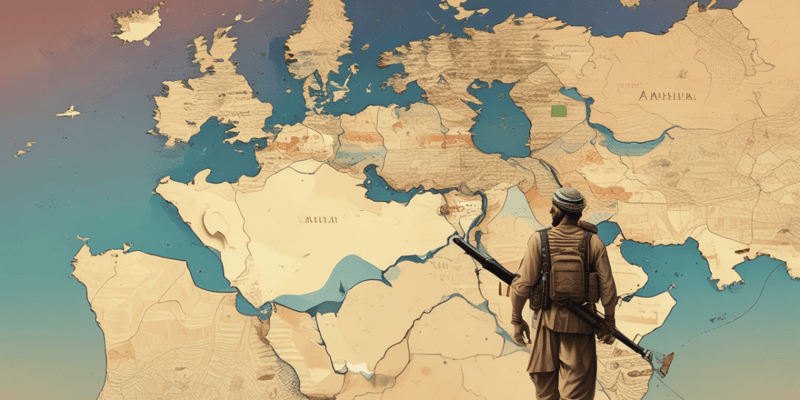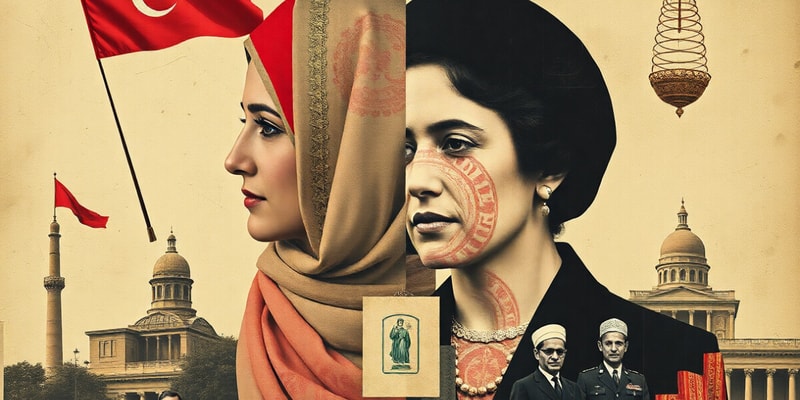Podcast
Questions and Answers
What was one of the major impacts of arbitrary borders imposed by colonial powers?
What was one of the major impacts of arbitrary borders imposed by colonial powers?
What was a significant outcome of Tunisia's revolution in 2011?
What was a significant outcome of Tunisia's revolution in 2011?
Which organization played a key role in mediating between political factions in Tunisia?
Which organization played a key role in mediating between political factions in Tunisia?
What aspect of Tunisia's society contributed to its political stability after the revolution?
What aspect of Tunisia's society contributed to its political stability after the revolution?
Signup and view all the answers
What long-term risk is associated with the strategy of suppressing civil society?
What long-term risk is associated with the strategy of suppressing civil society?
Signup and view all the answers
Which event marked the fall of Ben Ali in Tunisia?
Which event marked the fall of Ben Ali in Tunisia?
Signup and view all the answers
How do authoritarian regimes undermine civil society?
How do authoritarian regimes undermine civil society?
Signup and view all the answers
What role did the military play in Egypt during Mubarak's presidency?
What role did the military play in Egypt during Mubarak's presidency?
Signup and view all the answers
What was the focus of Tunisia's 2014 constitution?
What was the focus of Tunisia's 2014 constitution?
Signup and view all the answers
What event led to the overthrow of Mossadegh in Iran?
What event led to the overthrow of Mossadegh in Iran?
Signup and view all the answers
What was a notable characteristic of the political landscape in Tunisia from 2014 to 2019?
What was a notable characteristic of the political landscape in Tunisia from 2014 to 2019?
Signup and view all the answers
Which argument suggests that strong coercive power is linked to the persistence of authoritarianism?
Which argument suggests that strong coercive power is linked to the persistence of authoritarianism?
Signup and view all the answers
Which of the following does not accurately reflect a critique of the relationship between colonial legacy and authoritarianism?
Which of the following does not accurately reflect a critique of the relationship between colonial legacy and authoritarianism?
Signup and view all the answers
What critique is raised regarding the argument that great powers block democratization?
What critique is raised regarding the argument that great powers block democratization?
Signup and view all the answers
Which country experienced multi-party elections introduced in 1988 but faced a military intervention after an Islamist victory?
Which country experienced multi-party elections introduced in 1988 but faced a military intervention after an Islamist victory?
Signup and view all the answers
What factors contributed to Tunisia's democratic transition that were not present in other nations?
What factors contributed to Tunisia's democratic transition that were not present in other nations?
Signup and view all the answers
What is a significant critique of the cultural explanation for the lack of democracy in Islamic societies?
What is a significant critique of the cultural explanation for the lack of democracy in Islamic societies?
Signup and view all the answers
Which factor is NOT listed as a reason for the persistence of authoritarianism in the MENA region?
Which factor is NOT listed as a reason for the persistence of authoritarianism in the MENA region?
Signup and view all the answers
Which factor primarily allows states like Saudi Arabia and the UAE to avoid accountability to their citizens?
Which factor primarily allows states like Saudi Arabia and the UAE to avoid accountability to their citizens?
Signup and view all the answers
Which example illustrates the connection between external support and authoritarian regime survival?
Which example illustrates the connection between external support and authoritarian regime survival?
Signup and view all the answers
What primary reason is given for the fragmentation of opposition movements in Bahrain?
What primary reason is given for the fragmentation of opposition movements in Bahrain?
Signup and view all the answers
What strategy do authoritarian regimes often use to maintain their power during economic liberalization?
What strategy do authoritarian regimes often use to maintain their power during economic liberalization?
Signup and view all the answers
What significant change occurred in Egypt in 2011?
What significant change occurred in Egypt in 2011?
Signup and view all the answers
What has been a notable impact of the coercive apparatus in the MENA region?
What has been a notable impact of the coercive apparatus in the MENA region?
Signup and view all the answers
What is a common critique regarding resource-rich countries and democratization?
What is a common critique regarding resource-rich countries and democratization?
Signup and view all the answers
Which of the following best describes the democratic trend in Tunisia after 2011?
Which of the following best describes the democratic trend in Tunisia after 2011?
Signup and view all the answers
Which example illustrates the adaptation of authoritarian regimes to changing circumstances?
Which example illustrates the adaptation of authoritarian regimes to changing circumstances?
Signup and view all the answers
What is one argument made by critics of cultural explanations regarding democracy in Muslim societies?
What is one argument made by critics of cultural explanations regarding democracy in Muslim societies?
Signup and view all the answers
Which of the following is NOT a characteristic of upgraded authoritarianism?
Which of the following is NOT a characteristic of upgraded authoritarianism?
Signup and view all the answers
What can be a negative consequence of economic liberalization as evidenced by the Arab Spring?
What can be a negative consequence of economic liberalization as evidenced by the Arab Spring?
Signup and view all the answers
Which mechanism allows regimes like those in Jordan and Morocco to appear democratic?
Which mechanism allows regimes like those in Jordan and Morocco to appear democratic?
Signup and view all the answers
What role do oil rents play for authoritarian states?
What role do oil rents play for authoritarian states?
Signup and view all the answers
Study Notes
Middle East Politics: Democracy
- Middle Eastern countries exhibit a variety of political systems, ranging from flawed democracies to hybrid regimes and authoritarianism.
- A map displays the distribution of these different political classifications across the region.
- Global trends in democratization show fluctuations in the number of countries experiencing autocratization and democratization episodes over time.
- The Middle East has seen numerous instances of democratic movements, which have often been short-lived and encountered obstacles.
- Specific examples of attempts at democratization in Iran, Algeria, Iraq, and Egypt are detailed, showing a complex history of political transitions.
- Other countries in the MENA region (Middle East and North Africa) also experienced similar attempted transitions and outcomes.
Why Are Democracies Short-Lived in the Middle East?
- Cultural Explanations: Some argue that Islamic culture is incompatible with democracy, emphasizing communal loyalty and obedience to authority. However, this view is challenged by examples like Turkey, Tunisia, and Indonesia where Muslim-majority societies have adopted democratic institutions.
- Economic Explanations: The Rentier State theory suggests that states reliant on resource wealth (like oil) have less incentive to be accountable or to build participatory institutions. The patron-client relationship fostered by these economic systems may limit the demand for democratization. Additionally, economic liberalization sometimes exacerbates inequality and can fuel public discontent.
- Upgraded Authoritarianism: Authoritarian regimes adapt to maintain control by implementing selective reforms to create a facade of openness. These may include controlled elections, limited civil liberties, and some media freedom while maintaining underlying power structures. This strategy may provide short-term stability, but at the cost of potential future instability.
- Lack of Civil Society: Weak or suppressed civil society organizations can hinder the development of broad democratic movements. Authoritarian regimes often repress NGOs and independent media outlets, limiting political mobilization.
- Strong Coercive Apparatus: A powerful security apparatus (like the military) can suppress dissent and prevent democratization, as seen in Egypt under Mubarak or Syria under Assad. However, this doesn't apply to all cases, such as Tunisia.
- Geopolitical Factors: External powers (e.g., the U.S., Russia) may prop up authoritarian regimes that align with their geopolitical interests, such as maintaining regional stability or controlling resource access. This external support doesn't always guarantee long-term authoritarian rule, as demonstrated by the overthrow of leaders like Mubarak in Egypt, despite foreign support.
- Colonial Legacies: The arbitrary borders imposed by colonial powers have divided ethnic and religious groups, leading to unstable states and authoritarianism, as seen in Iraq and Lebanon.
Tunisia's Democratization
- Tunisia's case study illustrates a successful democratic transition.
- The rise against Ben Ali (2011), the interim government, the constitution, the election process and power-sharing all played integral roles in this transition.
- Key factors included effective civil society engagement, compromise among political actors, a relatively homogeneous society, and non-interference from the Tunisian military.
Studying That Suits You
Use AI to generate personalized quizzes and flashcards to suit your learning preferences.
Related Documents
Description
Explore the diverse political systems in the Middle East, ranging from flawed democracies to authoritarian regimes. This quiz delves into historical democratization efforts in countries like Iran, Iraq, Algeria, and Egypt, highlighting the challenges faced by democratic movements in the region. Assess your understanding of the complex political landscape and cultural barriers to democracy in the MENA region.




